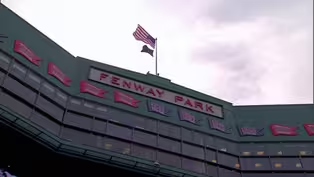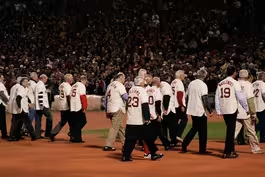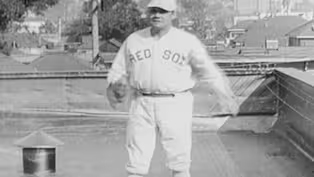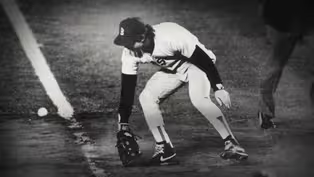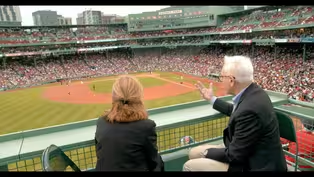
Racism and The Red Sox
Clip: Episode 1 | 3m 18sVideo has Closed Captions
In this clip, we look at checkered past and their resistance to signing black athletes.
The last team to integrate MLB, The Boston Red Sox have a "shameful past with respect to race relations," according to Sam Kennedy, President and CEO of The Boston Red Sox. In this clip, we look at the history of racism in a franchise known for turning away legendary athletes of color such as Willie Mays.
Problems playing video? | Closed Captioning Feedback
Problems playing video? | Closed Captioning Feedback
Iconic America: Our Symbols and Stories with David Rubenstein is a production of Show of Force, DMR Productions, and WETA Washington, D.C. David M. Rubenstein is the host and executive...

Racism and The Red Sox
Clip: Episode 1 | 3m 18sVideo has Closed Captions
The last team to integrate MLB, The Boston Red Sox have a "shameful past with respect to race relations," according to Sam Kennedy, President and CEO of The Boston Red Sox. In this clip, we look at the history of racism in a franchise known for turning away legendary athletes of color such as Willie Mays.
Problems playing video? | Closed Captioning Feedback
How to Watch Iconic America
Iconic America is available to stream on pbs.org and the free PBS App, available on iPhone, Apple TV, Android TV, Android smartphones, Amazon Fire TV, Amazon Fire Tablet, Roku, Samsung Smart TV, and Vizio.
Buy Now
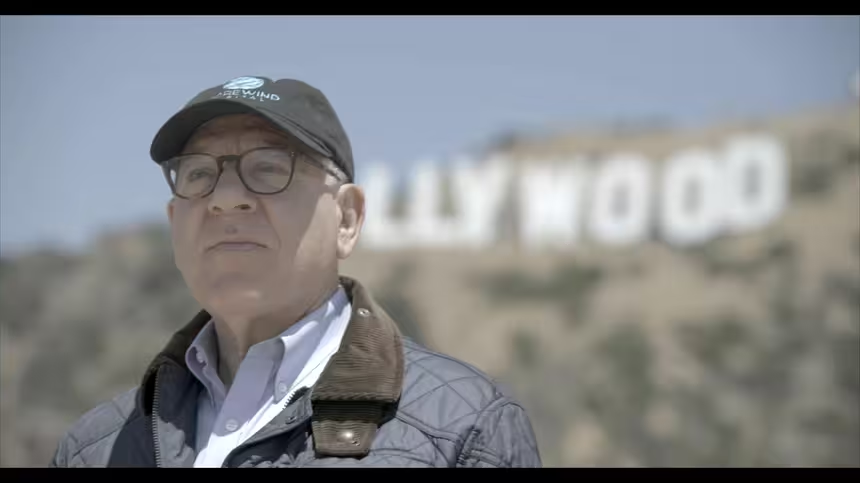
Our Symbols and Stories
David Rubenstein examines the history of America through some of its most iconic symbols, objects and places, in conversation with historical thinkers, community members and other experts. Together, they dive deep into each symbol’s history, using them as a gateway to understanding America’s past and present.Providing Support for PBS.org
Learn Moreabout PBS online sponsorship- The Red Sox had a line on Willie Mays before anybody else, in 1948, when Mays was 17 years old.
And Willie told me that, as a teenager, he went and told all of his friends that the Red Sox were coming down to look at him, and that he was going to the Major Leagues as a member of the Red Sox.
But I remember speaking with him and him telling me point blank that it was Tom Yawkey that didn't want him, that the Red Sox didn't want him.
- So do you think Tom Yawkey was racist, or you just think he was not willing to-- - Of course Tom Yawkey was a racist.
There's no reason to have this debate.
His resume is on the field.
- I was happy when some of that came out and when some of that had to be addressed.
And I know it was uncomfortable at times for people, but too bad.
You can't have this beloved franchise and not address the really huge smudge over all of it.
- The Red Sox have a shameful past with respect to race relations.
We were the last team to integrate.
And that is something that we live with forever.
I think it's important to acknowledge it.
And the last 20 years we've tried to make sure that Fenway is welcoming to all of Boston, all of New England, all of the world.
- In the end, do you think anything had to do with the city of Boston?
The city of Boston was not really pushing integration in the baseball team, or it was really Yawkey himself?
- Well, it's all the above.
Boston's a tough place.
I grew up here, I was born here, and it's not a welcoming place.
When I was a kid, it was not a welcoming place.
You wouldn't know that there were Black people from Boston based on how this city has marketed its own.
- [Reporter] Back then, 1983, there were no Black families in this or any Southie project.
Four years later, there are still no Black families in South Boston projects.
- The city of Boston has always been kind of a tribal, parochial, provincial.
East Boston's the Italian people, the North End's the Italian people.
And the Irish are in Southie.
And Black people in Roxbury.
And that doesn't change.
- As much as I love the Red Sox, I never thought as a kid of going, actually going to Fenway Park, because I figured I would probably face some type of racism, or prejudice, or hear the hard R inward, you know?
And, as a kid, that probably would've crushed me, being such a fan of baseball.
(somber music) - At the end of the day, the thing that you always have to remember is that there are beating hearts to this.
We're talking about people who really, really wanted to enjoy this and didn't get a chance to.
And that's the reason why the Red Sox are so important to this region, and that's also why they carry such a heavy burden.
What really separates the Red Sox was the fact that even after integration the Red Sox still didn't sign Black players.
The Boston Red Sox did not sign a Black free agent until 1992.
The Red Sox unwillingness to sign Black players, there's your curse.
You get players, you win.
Video has Closed Captions
Preview: Ep1 | 31s | No ballpark is more iconic than Fenway Park, home of the Boston Red Sox. (31s)
The 1967 Red Sox and The Impossible Dream
Video has Closed Captions
Clip: Ep1 | 45s | The comeback 1967 Red Sox won over fans and were known as the "Impossible Dream" team. (45s)
Video has Closed Captions
Clip: Ep1 | 37s | The Red Sox's World Series win in 2004 was a historic moment for the team and its fans. (37s)
Video has Closed Captions
Clip: Ep1 | 2m 57s | The Red Sox committed the original sin of baseball by trading Babe Ruth to The NY Yankees. (2m 57s)
The Red Sox' "Cursed" 1986 and 2003 Seasons
Video has Closed Captions
Clip: Ep1 | 4m 48s | No game epitomizes The Curse of the Bambino more than game 7 of the 1986 World Series. (4m 48s)
Should Fenway be a National Monument?
Video has Closed Captions
Clip: Ep1 | 54s | Fenway Park is the top attraction in Boston, and an international tourist destination. (54s)
Providing Support for PBS.org
Learn Moreabout PBS online sponsorshipSupport for PBS provided by:
Iconic America: Our Symbols and Stories with David Rubenstein is a production of Show of Force, DMR Productions, and WETA Washington, D.C. David M. Rubenstein is the host and executive...
